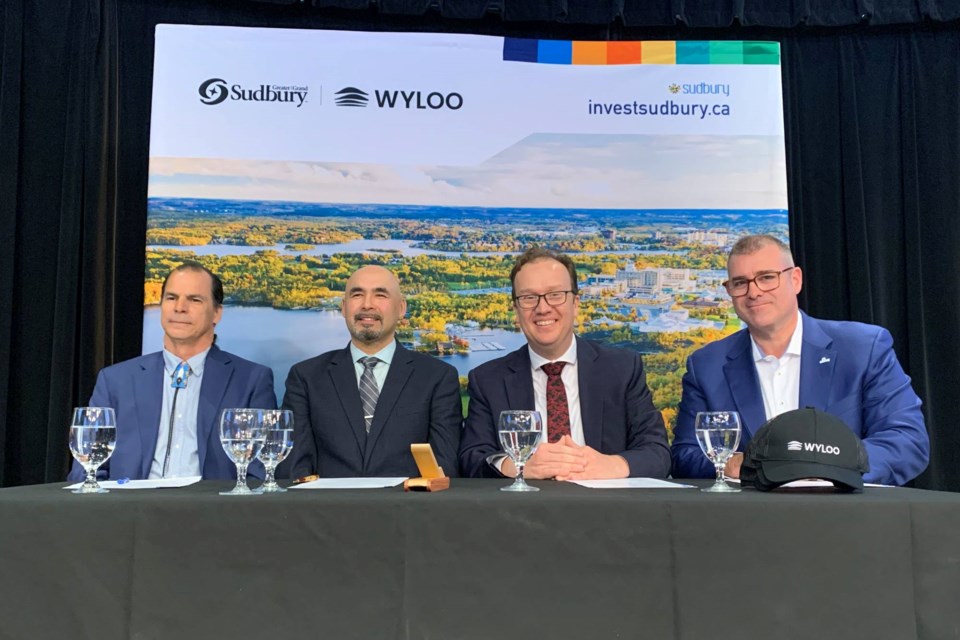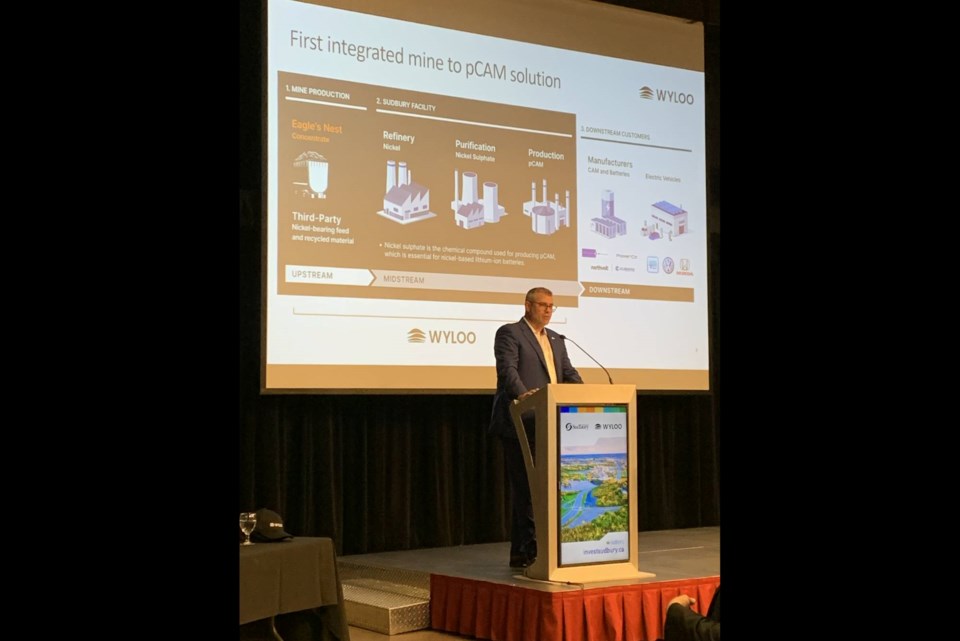Hundreds of jobs and economic development opportunities will be created in the region when Wyloo Canada builds its multi-million-dollar minerals processing plant in the City of Greater Sudbury.
Announced on May 29, the facility will be the first in Canada to process nickel sulphate and nickel-dominant precursor cathode active material (pCAM) — minerals needed to make the batteries used in electric vehicles.
Nickel extracted from the mine developer's Eagle’s Nest Mine, located in the James Bay Ring of Fire mineral belt, will be transported to the Sudbury facility, where it will be refined and purified before being shipped to downstream end users.
Wyloo anticipates producing enough material to supply roughly 250,000 electric vehicles annually, a number that’s expected to triple once it feeds material from third-party producers into the facility.
Kristan Straub, Wyloo Canada’s CEO, estimated the facility’s price tag at between $800 million and $900 million, similar to what it will cost to build its proposed mineral-processing facility in Kwinana, Western Australia.
As much as the projects are similar, however, Straub said there are distinct elements of each that could impact the final cost of the Canadian project.
The company won’t have that number until it finishes its feasibility study, but Straub couldn’t say when that might be complete.
“Part of our budgeting process is to actually work with the city and with the First Nations on what that feasibility study looks like so that they're also included in that process,” he said in an interview.

Although Wyloo has pinpointed a location in the city for the facility, it’s not making that public just yet, as it’s still working to finalize the acquisition.
But Straub said it will be located on “what we believe is an optimal piece of land” in an area the city has designated for industrial development.
As to when the location might be revealed, “that's going to rely on all the parties,” he said.
“It's not just a decision up to us; it's part of the whole collaboration between ourselves and the city and possibly the First Nations as well.”
Construction on the processing facility won’t begin until Eagle’s Nest is built, and work on the mine isn’t expected to start until 2027.
But once complete, “several hundreds of jobs” would be available at the processing plant, Straub said.
“The facility essentially consists of three different specific aspects to it: an area where we receive the products and the materials that are going to be processed; the first step of the processing facility, which is the conversion of the nickel-bearing materials into a nickel sulfate; and then the last part of it, which is producing the precursor cathode active material (pCAM),” he said.
When asked how the project will be financed, Straub said the company is looking at all options, including First Nation buy-in and government funds.
“It's been no secret that both Canada and the U.S. have announced different funding mechanisms for processes like this, and we'll explore all funding opportunities jointly with our partners as we progress the development of the project.”
Straub refuted the idea that Wyloo’s decision to site the plant in Sudbury is directly related to Honda’s late April announcement of $15 billion for four plants in Ontario, including an electric vehicle battery plant in Alliston.
But he did say Wyloo was influenced by the many announcements being made across Canada about upcoming cell and battery manufacturing projects.
Straub said Wyloo believes it can alleviate the current bottleneck of chemicals that are needed to make batteries, and getting first to market gives them an advantage, he said.
“Currently, today, there's about a 10th of the nickel sulphate that's required to feed the projected battery manufacturing capacity by 2030,” Straub said.
“So, with that, we believe that we can supply a good portion of that through our particular plant and third-party other feeds that we would bring in.”

Wednesday’s announcement focused on the signing of a memorandum of understanding (MOU) between Wyloo, the City of Greater Sudbury, Atikameksheng Anishnawbek, and Wahnapitae First Nation.
Straub said it’s just the first step in determining what role each First Nation might play in the partnership, whether it’s ownership of businesses located within the processing plant or subsidiary businesses supplying goods and services to the facility.
Wyloo remains committed to working with the First Nations on figuring those details out, he noted.
“It's important that we start this work early so that we can define what an outcome is rather than waiting to say ‘Hey, we have a plant and we have an operation, how can we bolt you on afterwards,’” Straub said, “which is why we believe (in) engaging with the First Nations up front, much like we have with our Eagle's Nest project … and define what those things are.
“The First Nations have a right to their decision-making and what they envision as their participating in the process as well.”
During the announcement, Straub was joined by Chief Craig Nootchtai of Atikameksheng Anishnawbek and Chief Larry Roque of Wahnapitae First Nation along with Sudbury Mayor Paul Lefebvre, Ontario Mines Minister George Pirie and other dignitaries.
Nootchtai noted how important it is for Indigenous people to be involved in major resource projects that bring economic opportunity to their communities.
“We support business as long as we are part of the entire process from start to finish from planning, through design, through construction, through production, and closure,” Nootchtai said.
“And that's our goal as Atikameksheng. We're here to participate. We're here to support. We're here to provide our feedback and our guidance where it's needed.”
Echoing his words, Roque said Wyloo’s announcement marks a change in how resource companies share the wealth with Indigenous partners.
Rather than situating plants, and jobs, in southern Ontario, the Wyloo project means more direct benefit for the communities that call this area home.
“Minerals come from the North, so we should create jobs in the North, and Wyloo, I thank you for doing that,” he said.
Wyloo's announcement was made to coincide with the third annual BEV In Depth conference, which is being hosted by the city May 29-30 at Cambrian College.




